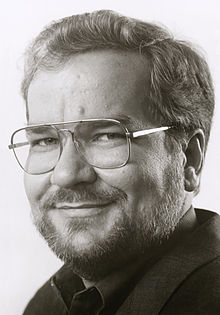Phil Zimmermann
| Phil Zimmermann | |
|---|---|
 |
|
| Born |
February 12, 1954 Camden, New Jersey |
| Known for | Creator of Pretty Good Privacy |
Philip R. "Phil" Zimmermann, Jr. (born February 12, 1954) is the creator of Pretty Good Privacy (PGP), the most widely used email encryption software in the world. He is also known for his work in VoIP encryption protocols, notably ZRTP and Zfone. Zimmermann is co-founder and Chief Scientist of the global encrypted communications firm, Silent Circle.
He was born in Camden, New Jersey. His father was a concrete mixer truck driver. Zimmermann received a B.S. degree in computer science from Florida Atlantic University in Boca Raton, Florida in 1978, and thereafter moved to the San Francisco Bay Area. In the 1980s, Zimmermann worked in Boulder, Colorado as a software engineer and was a part of the Nuclear Weapons Freeze Campaign as a military policy analyst.
In 1991, he wrote the popular Pretty Good Privacy (PGP) program, and made it available (together with its source code) through public FTP for download, the first widely available program implementing public-key cryptography. Shortly thereafter, it became available overseas via the Internet, though Zimmermann has said he had no part in its distribution outside the United States.
The very first version of PGP included an encryption algorithm, BassOmatic, developed by Zimmermann.
After a report from RSA Security, who were in a licensing dispute with regard to the use of the RSA algorithm in PGP, the United States Customs Service started a criminal investigation of Zimmermann, for allegedly violating the Arms Export Control Act. The United States Government had long regarded cryptographic software as a munition, and thus subject to arms trafficking export controls. At that time, the boundary between what cryptography was permitted ("low-strength") and impermissible ("high-strength") for export from the United States was placed such that PGP fell on the too-strong-to-export side of the boundary. The boundary for legal export has since been raised and now allows PGP to be exported. The investigation lasted three years, but was finally dropped without filing charges.
...
Wikipedia
